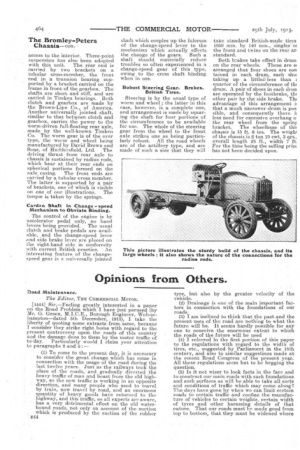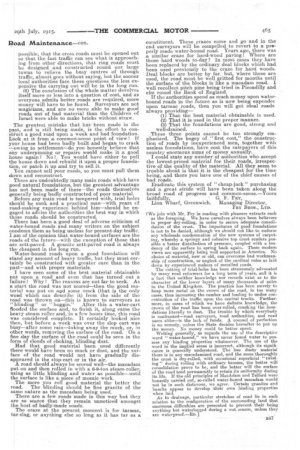Opinions from Others.
Page 16

Page 17

If you've noticed an error in this article please click here to report it so we can fix it.
Road Maintenance.
The Editor, THE COMMERCIAL MOTOR.
[1444] Sir,—Feeling greatly interested in a paper on the Road Problem which I have just perused (by Mr. G. Green, MICE., Borough Engineer' Wolverhampton—dated 5th December, 1913), I take the liberty of quoting some extracts from same, because I consider they strike right home with regard to the present controversy upon the roads of this country aid the damage done to them by the motor traffic of to-day. Particularly would I claim your attention to paragraphs 2 and 5 :—
(1) To come to the present day, it is necessary to consider the great change which has come in connection with the usage of the road during the last twelve years. Just as the railways took the place of the roads, and gradually diverted the heavy traffic of man and beast from the old highway, so the new traffic is working in an opposite direction, and many people who used to travel by train, now travel by road, and an enormous quantity of heavy goods have returned to the highway, and this traffic, as all experts are aware, has a very detrimental effect on the old waterbound roads, not only on account of the suction which is produced by the suction of the rubber D44 tyre, but also by the greater velocity of the vehicle.
(2) Drainage is one of the main important factors in connection with the foundations of our roads.
(3) I am inclined to think that the past, and the present uses of the road are nothing to what the future will be. It seems hardly possible for any one to conceive the enormous extent to which the roads of the future will be used (4) I referred in the first portion of this paper to the regulations with regard to the width of tires, etc. suggested by Parliament in the 18th century, and also to similar suggestions made at the recent Road Congress of the present year. All these regulations seem but to be begging the question.
(5) Is it not wiser to look facts in the face and to construct our main roads with such foundations and such surfaces as will be able to take all sorts and conditions of traffic which may come along? The days have gone by when we can limit certain roads to certain traffic and confine the manufacture of vehicles to certain weights, certain width of tyres and other harassing details of that nature. That our roads must he made good from top to bottom, that they must be widened where
possible, that the cross roads must be opened out so that the fast traffic can see what is approaching from other directions, that ring roads must be designed and constructed round our large towns to relieve the busy centres of through traffic, almost goes without saying, but the sooner local authorities face these questions the less expensive the carrying out will be in the long run. (6) The conclusion of the whole matter devolves itself more or less into a, question of east, and as everyone admits better roads are required, more money will have to be found. Surveyors are not magicians, and are no more able to make good roads out of bad material than the Children of Israel were able to make bricks without straw.
'The greatest mistake that hä' been made in the past, and is still being made, is the effort to eonstruet a good read uPon a Weak and bad foundation. Leek at it from a conirnon-sense point of view! If your house had been badly built and began to crack —owing to settlement—do you honestly believe that any underpinning or repairs would make it a good house again? No l You would have either to pull the house down and rebuild it upon a proper foundation or patch it up and try to sell it. You cannot sell your roads, so you must pull them down and reconstruct.
There are undoubtedly many main roads which have good natural foundations, but the greatest advantage has not been made of these—the roads themselves generally being badly constructed of poor material. Before any main road is tampered with, trial holes should be sunk and a practical man—with years ef road-making experience behind him—should be engaged to advise the authorities the best way in which those roads should be constructed.
There has been a good deal of adverse criticism of water-bound roads and many writers on the subject condemn them as being useless for present-day traffic. I am of the opinion that water-bound surfaces are the roads of the future—with the exception of those that are sett-paved. A granite sett-paved road is always the cheapest in the long run. Water-bound roads upon a good foundation will stand any amount of heavy traffic, but they must certainly be constructed with greater care than in the past—and with proper materials.
I have seen some of the best material obtainable put upon a road and even that has turned out a failure 1 Why ? The reasons are not far to seek. As a start the road was not scored—then the good material was put on and some muck (that is the only woxi which can describe it from the side of the road was thrown on—this is known to surveyors as "blinding" or " hoggin." After this a water-cart flooded the surface and, to finish it, along came the heavy steam roller and, in a few hours time, this road was considered complete. It certainly looked nice then, but before a week was over the slop cart was busy—after some rain—taking away the muck, or, other words, removing the surface of the road. On a fine day the surface of the road could be seen in the form of clouds of choking, blinding dust.. Had that good material been used differently there would have been no muck or dust, and the surface of the road would not have gradually disappeared in the slop-cart or in the air. A road should always he scored well—the macadam put on and then rolled in with a 6-9-ton steam-roller, using as little blinding and water as possible—until the surface is like a piece of mosaic work. The more you roll good material the better the road. The blinding should be fine granite of the same nature as the macadam being used There are a few roads made in this way but they are so scarce that they remain unnoticed amongst the host of badly-made reads. The craze at the present moment is for tarmac, tar-slag, or anything else so long as it has tar as a constituent. These grazes come and go–and in the end surveyors will be compelled to revert to a properly made water-bound road. Years ago, there was a similar craze for hard-wood paving ! Where are those hard woods to-day ? In most cases they have been replaced by the ordinary deal blocks which had been used previously to the_ craze for hard woods. Deal blocks are better by far, but, where these are used, the road must be well gritted for months until the surface of the blocks is like a macadam road. I well recollect pitch pine being tried in Piccadilly and elm round the Bank of England. If the authorities spend as much money upon waterbound roads in the future as is now being expendec upon tarmac roads, then you will get ideal roads always providing 1) That the best material .obtainable is used. 2) That it is used in the proper manner. 3) That the foundations are good, strong and . well-drained. . . .
These three points cannot be too strongly emphasized. The bogey of "first cost," the construction of roads by inexperienced men, together with useless foundations, have cost the ratepayers of this country enormous sums of money annually.
I could -state any number of authorities who accept the lowest-priced material for their roads, irrespective of the quality of the material. All they seem to trouble about is that it is the cheapest for the time being, and there you have one of the chief causes of bad roads.
Eradicate this system of " cheap-jack " purchasing and a great stride will have been taken along the broad road of progress and common-sense.—Yours faithfully, . G. F. FRY, Lion Wharf, Greenwich. Managing Director, FRY BROS., LTD.
[We join with Mr. Fry in reading with pleasure extracts such as the foregoing.We have ourselves always been believers in proper dry-rolling, in order to secure adequate consolidation of the crust. The importance of good foundations is not to be denied, although we should not like to endorse any wholesale condemnation of the new systems of carpetjug, whereby a springy and cohesive top crust renders possible a better distribution of pressure, coupled with a tendency of the surface to spring back again. These modern views are apparently being well supported in America. No choice of material, new or old, can overcome bad workmanship of construction, or neglect of the cardinal rules as laid down by experienced makers of metalled roads.
The cutting of trial-holes has been strenuously advocated by many road reformers for a long term of years, an& it is a fact that neither knowledge nor records exist as to the character of the lower layers of many thousands of miles in the United Kingdom. The practice has been merely to heap more metal on the crown of the road, in too many cases, thus increasing the camber and leading to undue concentration of the traffic upon the central tracks. Furthermore, in cases of which we have definite knowledge, the crown of the road has been over-rolled, crush:ng the foundations literally to dust. The trouble by which everybody is confronted—road surveyors, road authorities, and road users alike—is the lack of funds. A counsel of perfection is no remedy, unless the State decides hereafter to put up the money. No money could be better spent. Writing generally, as regards the use of the descriptive word "water-hound," we have never found water to possess any binding properties whatsoever. The use of the word in the implied sense is incorrect, although its significance is generally understood. The less dusty material there is in any macadamized road, and the more thoroughly the crust is ary-rolled, with occasional superficial " twisting " during rolling with ordinary brooms, the better will consolidation prove to be, and the better will the surface of the road tend permanently to retain its uniformity during its life. If the old principles of MacAdam and Telford were honestly carried out, so-called water-bound macadam would not be in such disfavour, we agree. Certain granites and basalts appear to develop their own binding properties when laid. .
As to drainage, particular stretches of road lie in such relation to the configuration of the surrounding land that enormous difficulties are presented to prevent their being anything but waterlogged during a wet season, unless they are waterproof.—En.] • .






















